University Marketing Report: E-commerce Impact on Purchases
VerifiedAdded on 2023/04/24
|5
|1014
|224
Report
AI Summary
This report provides a critical analysis of the impact of e-commerce on customer purchase behavior. It explores how the growth of e-commerce, driven by information technology, has changed consumer behavior from traditional shopping to online purchasing. The report discusses how online platforms offer convenience, product information, and price comparisons, influencing consumer choices. It also highlights the value of studying e-commerce for marketing, emphasizing its role in understanding consumer preferences and predicting buying patterns. The analysis covers how management uses research to make informed decisions and how practitioner-researchers contribute to marketing strategies by understanding consumer behavior and designing effective marketing programs. The report references various studies to support its findings, offering insights into the relationship between e-commerce and consumer behavior.
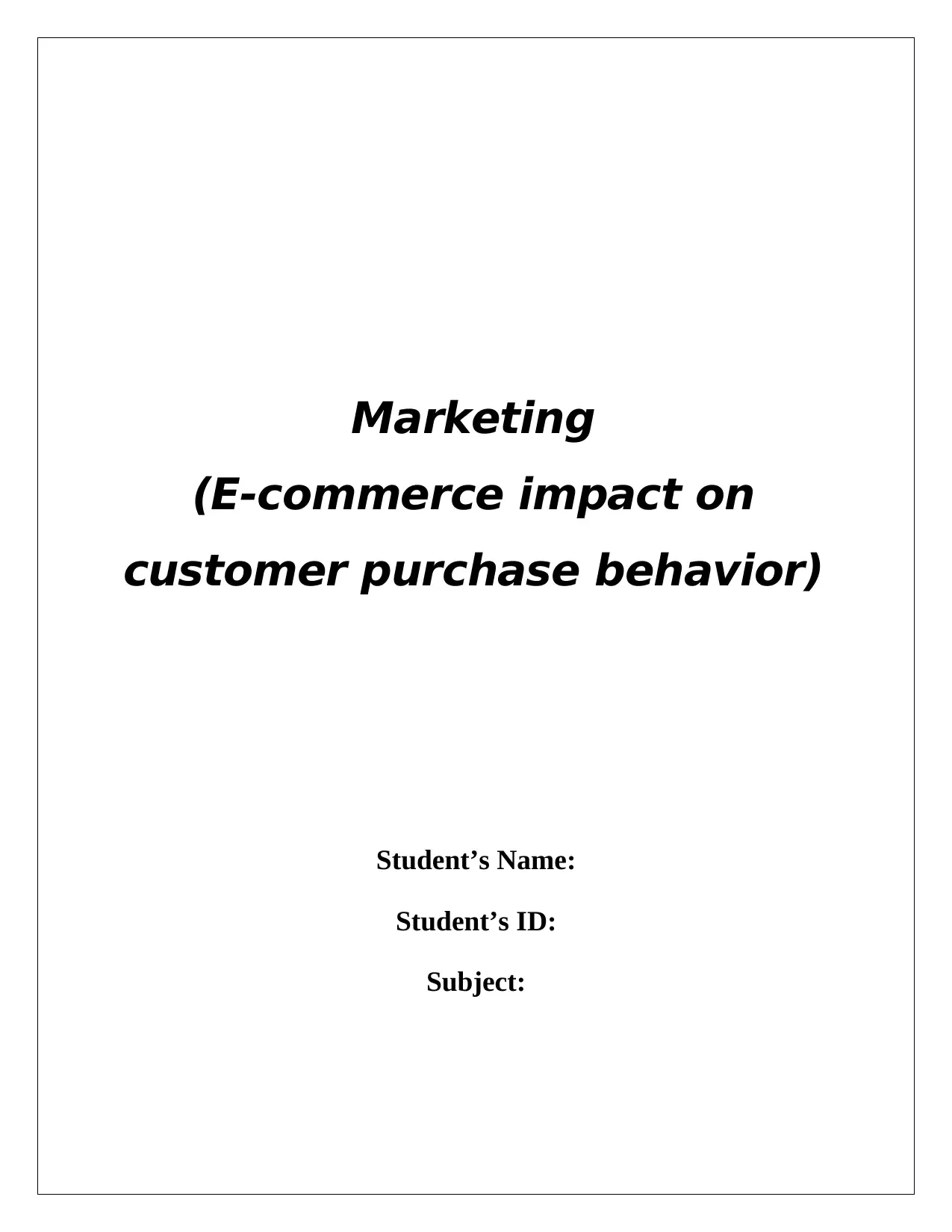
Marketing
(E-commerce impact on
customer purchase behavior)
Student’s Name:
Student’s ID:
Subject:
(E-commerce impact on
customer purchase behavior)
Student’s Name:
Student’s ID:
Subject:
Paraphrase This Document
Need a fresh take? Get an instant paraphrase of this document with our AI Paraphraser
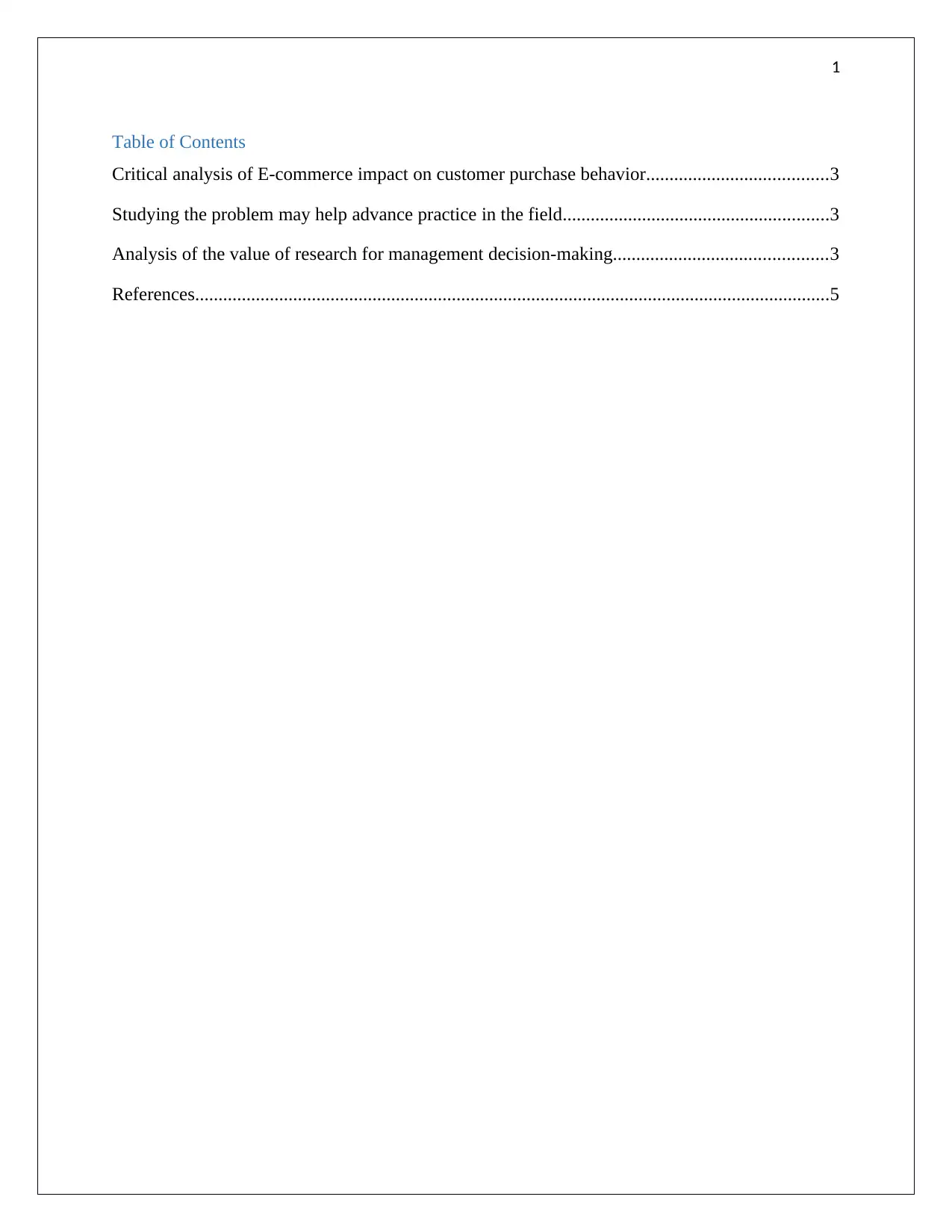
1
Table of Contents
Critical analysis of E-commerce impact on customer purchase behavior.......................................3
Studying the problem may help advance practice in the field.........................................................3
Analysis of the value of research for management decision-making..............................................3
References........................................................................................................................................5
Table of Contents
Critical analysis of E-commerce impact on customer purchase behavior.......................................3
Studying the problem may help advance practice in the field.........................................................3
Analysis of the value of research for management decision-making..............................................3
References........................................................................................................................................5
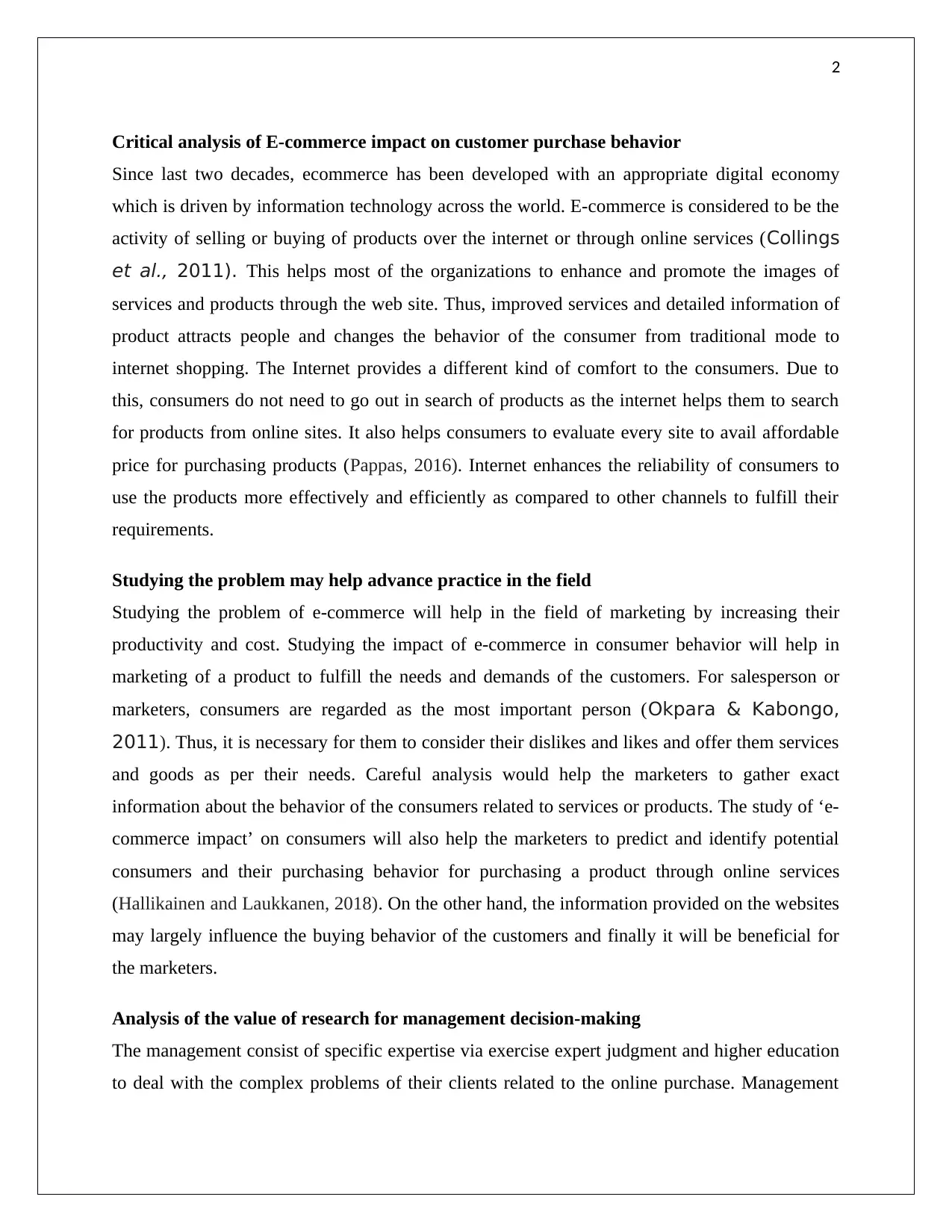
2
Critical analysis of E-commerce impact on customer purchase behavior
Since last two decades, ecommerce has been developed with an appropriate digital economy
which is driven by information technology across the world. E-commerce is considered to be the
activity of selling or buying of products over the internet or through online services (Collings
et al., 2011). This helps most of the organizations to enhance and promote the images of
services and products through the web site. Thus, improved services and detailed information of
product attracts people and changes the behavior of the consumer from traditional mode to
internet shopping. The Internet provides a different kind of comfort to the consumers. Due to
this, consumers do not need to go out in search of products as the internet helps them to search
for products from online sites. It also helps consumers to evaluate every site to avail affordable
price for purchasing products (Pappas, 2016). Internet enhances the reliability of consumers to
use the products more effectively and efficiently as compared to other channels to fulfill their
requirements.
Studying the problem may help advance practice in the field
Studying the problem of e-commerce will help in the field of marketing by increasing their
productivity and cost. Studying the impact of e-commerce in consumer behavior will help in
marketing of a product to fulfill the needs and demands of the customers. For salesperson or
marketers, consumers are regarded as the most important person (Okpara & Kabongo,
2011). Thus, it is necessary for them to consider their dislikes and likes and offer them services
and goods as per their needs. Careful analysis would help the marketers to gather exact
information about the behavior of the consumers related to services or products. The study of ‘e-
commerce impact’ on consumers will also help the marketers to predict and identify potential
consumers and their purchasing behavior for purchasing a product through online services
(Hallikainen and Laukkanen, 2018). On the other hand, the information provided on the websites
may largely influence the buying behavior of the customers and finally it will be beneficial for
the marketers.
Analysis of the value of research for management decision-making
The management consist of specific expertise via exercise expert judgment and higher education
to deal with the complex problems of their clients related to the online purchase. Management
Critical analysis of E-commerce impact on customer purchase behavior
Since last two decades, ecommerce has been developed with an appropriate digital economy
which is driven by information technology across the world. E-commerce is considered to be the
activity of selling or buying of products over the internet or through online services (Collings
et al., 2011). This helps most of the organizations to enhance and promote the images of
services and products through the web site. Thus, improved services and detailed information of
product attracts people and changes the behavior of the consumer from traditional mode to
internet shopping. The Internet provides a different kind of comfort to the consumers. Due to
this, consumers do not need to go out in search of products as the internet helps them to search
for products from online sites. It also helps consumers to evaluate every site to avail affordable
price for purchasing products (Pappas, 2016). Internet enhances the reliability of consumers to
use the products more effectively and efficiently as compared to other channels to fulfill their
requirements.
Studying the problem may help advance practice in the field
Studying the problem of e-commerce will help in the field of marketing by increasing their
productivity and cost. Studying the impact of e-commerce in consumer behavior will help in
marketing of a product to fulfill the needs and demands of the customers. For salesperson or
marketers, consumers are regarded as the most important person (Okpara & Kabongo,
2011). Thus, it is necessary for them to consider their dislikes and likes and offer them services
and goods as per their needs. Careful analysis would help the marketers to gather exact
information about the behavior of the consumers related to services or products. The study of ‘e-
commerce impact’ on consumers will also help the marketers to predict and identify potential
consumers and their purchasing behavior for purchasing a product through online services
(Hallikainen and Laukkanen, 2018). On the other hand, the information provided on the websites
may largely influence the buying behavior of the customers and finally it will be beneficial for
the marketers.
Analysis of the value of research for management decision-making
The management consist of specific expertise via exercise expert judgment and higher education
to deal with the complex problems of their clients related to the online purchase. Management
⊘ This is a preview!⊘
Do you want full access?
Subscribe today to unlock all pages.

Trusted by 1+ million students worldwide
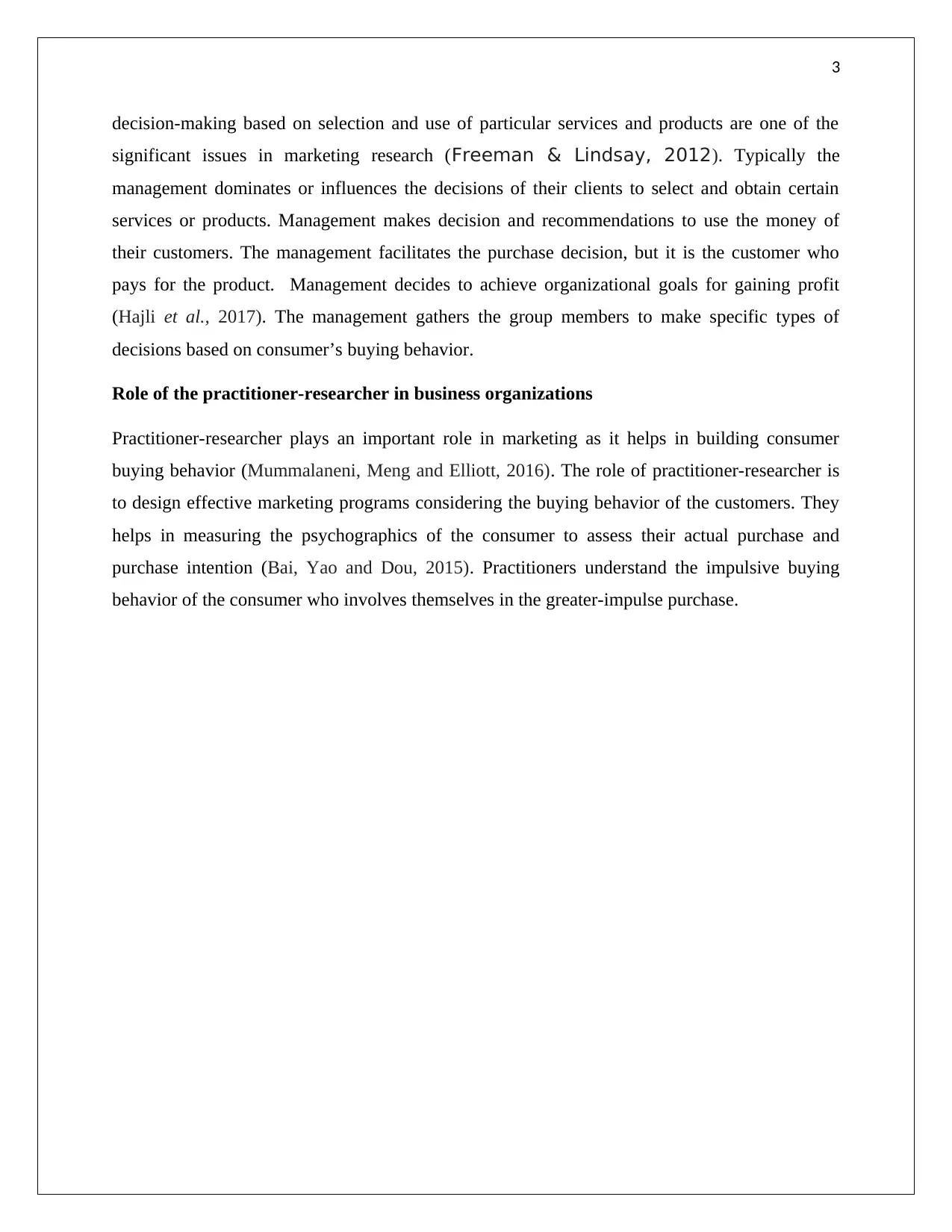
3
decision-making based on selection and use of particular services and products are one of the
significant issues in marketing research (Freeman & Lindsay, 2012). Typically the
management dominates or influences the decisions of their clients to select and obtain certain
services or products. Management makes decision and recommendations to use the money of
their customers. The management facilitates the purchase decision, but it is the customer who
pays for the product. Management decides to achieve organizational goals for gaining profit
(Hajli et al., 2017). The management gathers the group members to make specific types of
decisions based on consumer’s buying behavior.
Role of the practitioner-researcher in business organizations
Practitioner-researcher plays an important role in marketing as it helps in building consumer
buying behavior (Mummalaneni, Meng and Elliott, 2016). The role of practitioner-researcher is
to design effective marketing programs considering the buying behavior of the customers. They
helps in measuring the psychographics of the consumer to assess their actual purchase and
purchase intention (Bai, Yao and Dou, 2015). Practitioners understand the impulsive buying
behavior of the consumer who involves themselves in the greater-impulse purchase.
decision-making based on selection and use of particular services and products are one of the
significant issues in marketing research (Freeman & Lindsay, 2012). Typically the
management dominates or influences the decisions of their clients to select and obtain certain
services or products. Management makes decision and recommendations to use the money of
their customers. The management facilitates the purchase decision, but it is the customer who
pays for the product. Management decides to achieve organizational goals for gaining profit
(Hajli et al., 2017). The management gathers the group members to make specific types of
decisions based on consumer’s buying behavior.
Role of the practitioner-researcher in business organizations
Practitioner-researcher plays an important role in marketing as it helps in building consumer
buying behavior (Mummalaneni, Meng and Elliott, 2016). The role of practitioner-researcher is
to design effective marketing programs considering the buying behavior of the customers. They
helps in measuring the psychographics of the consumer to assess their actual purchase and
purchase intention (Bai, Yao and Dou, 2015). Practitioners understand the impulsive buying
behavior of the consumer who involves themselves in the greater-impulse purchase.
Paraphrase This Document
Need a fresh take? Get an instant paraphrase of this document with our AI Paraphraser
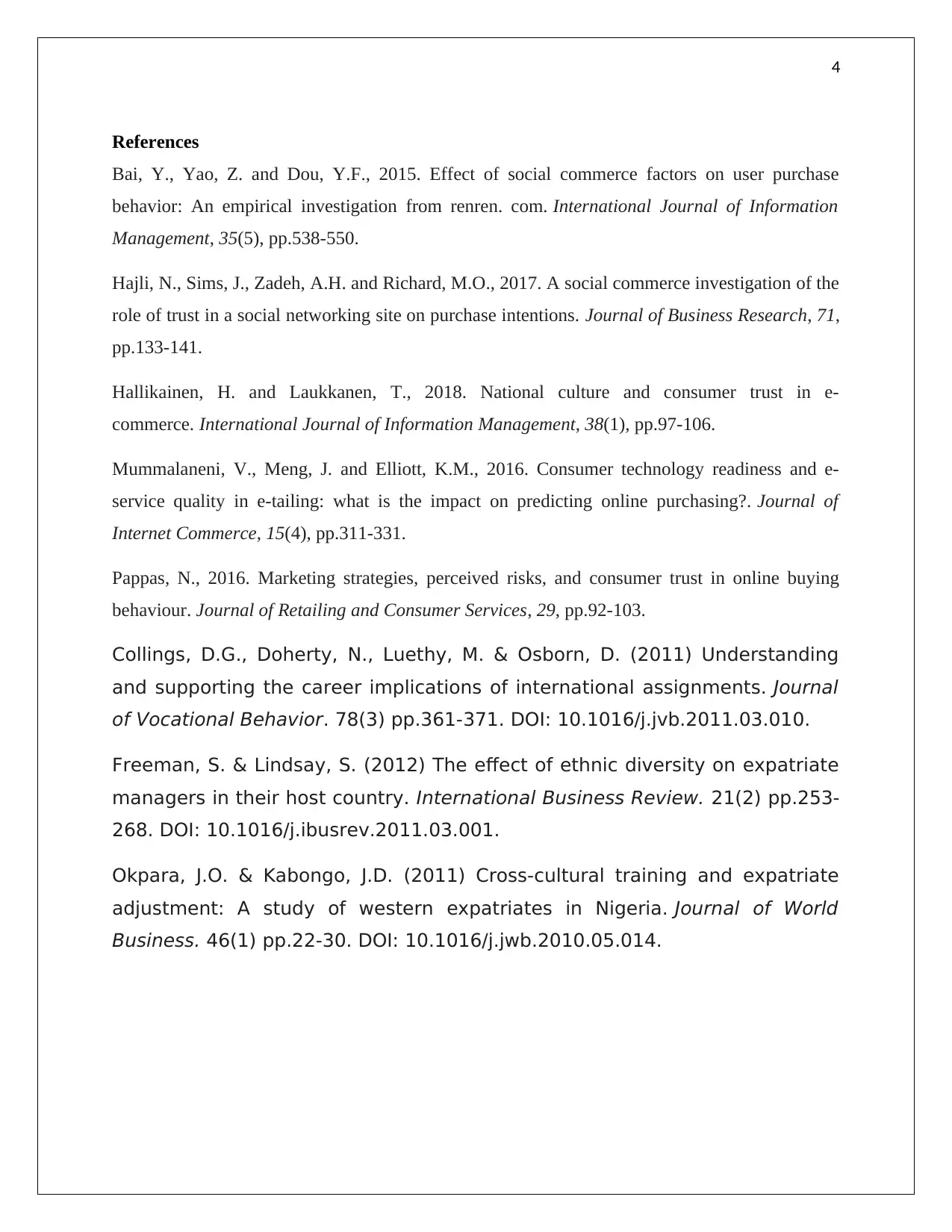
4
References
Bai, Y., Yao, Z. and Dou, Y.F., 2015. Effect of social commerce factors on user purchase
behavior: An empirical investigation from renren. com. International Journal of Information
Management, 35(5), pp.538-550.
Hajli, N., Sims, J., Zadeh, A.H. and Richard, M.O., 2017. A social commerce investigation of the
role of trust in a social networking site on purchase intentions. Journal of Business Research, 71,
pp.133-141.
Hallikainen, H. and Laukkanen, T., 2018. National culture and consumer trust in e-
commerce. International Journal of Information Management, 38(1), pp.97-106.
Mummalaneni, V., Meng, J. and Elliott, K.M., 2016. Consumer technology readiness and e-
service quality in e-tailing: what is the impact on predicting online purchasing?. Journal of
Internet Commerce, 15(4), pp.311-331.
Pappas, N., 2016. Marketing strategies, perceived risks, and consumer trust in online buying
behaviour. Journal of Retailing and Consumer Services, 29, pp.92-103.
Collings, D.G., Doherty, N., Luethy, M. & Osborn, D. (2011) Understanding
and supporting the career implications of international assignments. Journal
of Vocational Behavior. 78(3) pp.361-371. DOI: 10.1016/j.jvb.2011.03.010.
Freeman, S. & Lindsay, S. (2012) The effect of ethnic diversity on expatriate
managers in their host country. International Business Review. 21(2) pp.253-
268. DOI: 10.1016/j.ibusrev.2011.03.001.
Okpara, J.O. & Kabongo, J.D. (2011) Cross-cultural training and expatriate
adjustment: A study of western expatriates in Nigeria. Journal of World
Business. 46(1) pp.22-30. DOI: 10.1016/j.jwb.2010.05.014.
References
Bai, Y., Yao, Z. and Dou, Y.F., 2015. Effect of social commerce factors on user purchase
behavior: An empirical investigation from renren. com. International Journal of Information
Management, 35(5), pp.538-550.
Hajli, N., Sims, J., Zadeh, A.H. and Richard, M.O., 2017. A social commerce investigation of the
role of trust in a social networking site on purchase intentions. Journal of Business Research, 71,
pp.133-141.
Hallikainen, H. and Laukkanen, T., 2018. National culture and consumer trust in e-
commerce. International Journal of Information Management, 38(1), pp.97-106.
Mummalaneni, V., Meng, J. and Elliott, K.M., 2016. Consumer technology readiness and e-
service quality in e-tailing: what is the impact on predicting online purchasing?. Journal of
Internet Commerce, 15(4), pp.311-331.
Pappas, N., 2016. Marketing strategies, perceived risks, and consumer trust in online buying
behaviour. Journal of Retailing and Consumer Services, 29, pp.92-103.
Collings, D.G., Doherty, N., Luethy, M. & Osborn, D. (2011) Understanding
and supporting the career implications of international assignments. Journal
of Vocational Behavior. 78(3) pp.361-371. DOI: 10.1016/j.jvb.2011.03.010.
Freeman, S. & Lindsay, S. (2012) The effect of ethnic diversity on expatriate
managers in their host country. International Business Review. 21(2) pp.253-
268. DOI: 10.1016/j.ibusrev.2011.03.001.
Okpara, J.O. & Kabongo, J.D. (2011) Cross-cultural training and expatriate
adjustment: A study of western expatriates in Nigeria. Journal of World
Business. 46(1) pp.22-30. DOI: 10.1016/j.jwb.2010.05.014.
1 out of 5
Related Documents
Your All-in-One AI-Powered Toolkit for Academic Success.
+13062052269
info@desklib.com
Available 24*7 on WhatsApp / Email
![[object Object]](/_next/static/media/star-bottom.7253800d.svg)
Unlock your academic potential
Copyright © 2020–2026 A2Z Services. All Rights Reserved. Developed and managed by ZUCOL.





